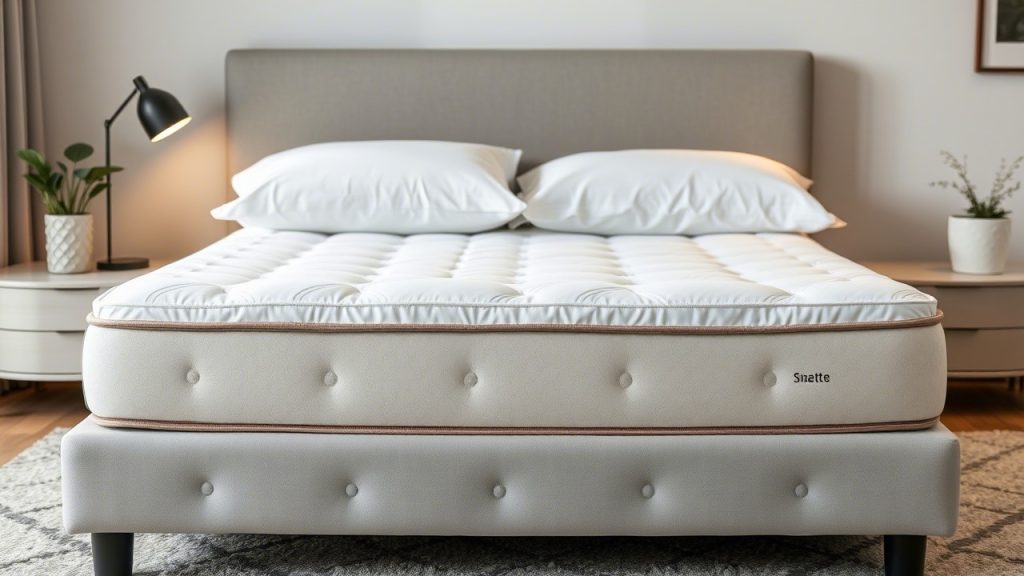Smart Mattresses – Are They Worth It? A Complete Guide
Technology is continuously making its way into every aspect of our lives, and the mattress industry is no exception. Smart mattresses have been gaining popularity over the past few years, promising not only better sleep quality but also a whole new level of convenience. But are these high-tech beds truly worth the investment? We’ll dive deep into what smart mattresses are, how they work, and whether they live up to the hype.
What Are Smart Mattresses?
A smart mattress is a mattress equipped with technology designed to monitor and improve your sleep quality. These mattresses typically feature built-in sensors, adjustability features, and even integration with apps or other smart devices. Depending on the model, smart mattresses can track your heart rate, breathing patterns, movement, and sleep cycles, helping to provide personalized sleep insights.
While most traditional mattresses are designed simply for comfort and support, smart mattresses bring additional features that focus on improving the quality of your sleep by adjusting to your body’s needs. Some may even change firmness levels, temperature, or support to match your sleeping preferences.
Key Features of Smart Mattresses
Smart mattresses vary in features, but the most common ones include:
1. Sleep Tracking and Analytics
One of the primary features of smart mattresses is sleep tracking. These mattresses can monitor various aspects of your sleep, including:
- Sleep stages: Light, deep, and REM sleep
- Sleep duration: How long you sleep each night
- Heart rate: Average heart rate during sleep
- Breathing patterns: How often you wake up due to breathing irregularities
- Movement: How often you toss and turn
This data is then analyzed and presented through a smartphone app, giving you insights into your sleep quality, duration, and areas of improvement. Some mattresses offer detailed reports that can help you make lifestyle changes for better sleep.
2. Automatic Adjustments
Some smart mattresses offer features like automatic firmness adjustments based on your sleeping position or body weight. These adjustments aim to ensure your spine remains aligned throughout the night, reducing the risk of waking up with aches or pains.
Additionally, certain smart mattresses have temperature control features, allowing you to adjust the heat or coolness of your bed to find the optimal sleeping environment. This is particularly beneficial for people who tend to sleep hot or cold.
3. Integration with Other Smart Devices
Smart mattresses often connect with other smart home devices, such as voice assistants, smart thermostats, or sleep-related devices like CPAP machines. Integration with platforms like Alexa or Google Assistant allows users to control the mattress settings with their voice, providing hands-free convenience.
Some models can also sync with fitness trackers to give you a more comprehensive overview of your health and wellness. For example, if you use a Fitbit or Apple Watch, your mattress might integrate with the data collected from those devices to offer more accurate sleep insights.
4. Smart Alerts
Certain smart mattresses can send alerts to your smartphone or other connected devices if they detect sleep disturbances. For instance, if the mattress notices that you’re moving frequently during the night, it may notify you or recommend adjustments, such as changing the firmness level or sleeping position. Some mattresses also monitor your breathing patterns to detect snoring or other sleep-related issues.
5. Customization
Customization options vary across models, but many smart mattresses allow you to tailor features such as firmness, temperature, and even comfort zones. Some beds have dual adjustable firmness settings for couples, so each person can customize their side of the bed based on individual preferences.
Pros of Smart Mattresses
While the features of smart mattresses may seem overwhelming, they come with a number of benefits. Let’s explore the top advantages of investing in a smart mattress:
1. Improved Sleep Quality
The most significant advantage of a smart mattress is its ability to enhance your sleep quality. With personalized sleep insights and automatic adjustments, you can optimize your mattress for the best night’s rest possible. Smart mattresses help you track and analyze factors that impact your sleep, such as your sleeping position, breathing, and even body temperature. This information can help you make lifestyle or environmental changes to improve your sleep quality over time.
2. Personalized Comfort
Everyone has different preferences when it comes to sleep. Some people prefer a soft mattress, while others need a firmer surface. Smart mattresses let you adjust your bed’s firmness and temperature, ensuring that you get a personalized level of comfort. For couples with different preferences, many models offer dual-zone settings, so each person can customize their side of the bed.
3. Health Benefits
Smart mattresses often track your vital signs, such as heart rate and breathing patterns. This data can help you identify potential health concerns like sleep apnea or heart-related issues. If a problem is detected, your mattress might send alerts or recommendations that encourage you to seek medical advice. Additionally, some mattresses can track your movements during sleep and provide tips for improving sleep posture, reducing the risk of waking up with aches and pains.
4. Convenience
The convenience of being able to adjust your mattress with a smartphone or voice command is a major selling point. You no longer need to manually adjust your mattress with a remote control or mechanical knobs. With smart mattresses, everything is done with a tap of a button or a voice command. This is especially helpful for people with mobility issues or those who enjoy a high-tech living space.
5. Cooler Sleep Environment
For those who tend to sleep hot, many smart mattresses offer temperature control features, allowing you to adjust the warmth or coolness of your bed. This can be particularly helpful for people who experience night sweats or live in warmer climates. Some mattresses even feature a cooling gel layer to help regulate your body temperature and keep you comfortable all night long.
Cons of Smart Mattresses
While smart mattresses offer a range of advantages, they also come with some drawbacks. Let’s take a look at the potential downsides:
1. High Price Tag
One of the most significant disadvantages of smart mattresses is their cost. They are typically much more expensive than traditional mattresses, due to the technology and sensors built into them. Depending on the brand and features, smart mattresses can range from $1,000 to over $4,000, making them a significant investment.
2. Potential Technical Issues
Because smart mattresses rely on technology, they are more prone to technical glitches compared to traditional mattresses. Software bugs, connectivity issues, or sensor malfunctions could interfere with your ability to track your sleep or adjust your mattress settings. If the mattress or app isn’t working correctly, it could lead to frustration or sleep disturbances.
3. Learning Curve
While some people will enjoy the advanced features and customization options of a smart mattress, others might find it overwhelming. It may take some time to learn how to use all the app features and make adjustments to the mattress settings. If you aren’t tech-savvy, it might be challenging to take full advantage of the smart features.
4. Battery Life
Many smart mattresses require charging or a continuous power supply for the sensors and adjustability features. If the battery runs out, it could affect the mattress’s ability to perform certain functions, such as firmness adjustments or sleep tracking. This may not be ideal if you prefer a low-maintenance mattress.
5. Durability Concerns
Because of the added technology in smart mattresses, there are concerns about their long-term durability. The sensors, motors, and wiring inside the mattress could wear out over time, potentially leading to malfunctions or reduced functionality. Regular use of the mattress’s smart features may also reduce its overall lifespan.
Are Smart Mattresses Worth It?
Whether a smart mattress is worth the investment depends on your individual needs and preferences. Here are some factors to consider when deciding:
- Do you value sleep insights? If you’re someone who wants to track your sleep and receive detailed analytics to improve your health and wellness, a smart mattress may be a great fit. It can provide you with insights that can help you sleep better over time.
- Do you need a customized sleep environment? If you’re a person who struggles with temperature control or firmness, a smart mattress may be worth it. The ability to adjust settings for personalized comfort can enhance your overall sleep quality.
- Are you tech-savvy? If you enjoy high-tech gadgets and are comfortable using smartphone apps or voice assistants, you’ll likely appreciate the advanced features of a smart mattress. However, if you prefer simplicity, the technology might feel unnecessary or even overwhelming.
- Are you willing to invest in your sleep? Smart mattresses come with a hefty price tag, so it’s essential to weigh the cost against the benefits. If you’re willing to invest in better sleep quality and the convenience of smart features, it could be a good investment.
Frequently Asked Questions
1. How does a smart mattress work?
A smart mattress uses built-in sensors to track your sleep patterns, including movement, heart rate, and breathing. Some smart mattresses also adjust firmness and temperature to improve your sleep environment.
2. Can a smart mattress help with sleep apnea?
Some smart mattresses monitor breathing patterns and can alert you if irregularities, such as snoring or shallow breathing, are detected. However, they are not a substitute for a medical diagnosis or treatment for sleep apnea.
3. Do I need an app to use a smart mattress?
Yes, most smart mattresses require a smartphone app to monitor your sleep, adjust settings, and view analytics. The app may also integrate with other smart devices for added convenience.
4. Are smart mattresses compatible with voice assistants like Alexa or Google Assistant?
Many smart mattresses offer integration with Alexa or Google Assistant, allowing you to adjust settings such as firmness or temperature with voice commands.
5. How much do smart mattresses cost?
Smart mattresses can range in price from $1,000 to over $4,000, depending on the brand and features. They tend to be more expensive than traditional mattresses due to the technology built into them.
6. Do smart mattresses require a power source?
Yes, smart mattresses typically require a power supply for their sensors, adjustability features, and any temperature control systems.
7. Can a smart mattress improve my sleep quality?
Yes, smart mattresses can help improve sleep quality by offering personalized adjustments to your mattress and providing valuable insights into your sleep patterns.
8. Are smart mattresses durable?
The durability of a smart mattress depends on the quality of materials and technology used. Some mattresses may experience wear and tear over time, particularly in the sensors or adjustability systems.
9. What are the benefits of temperature control in a smart mattress?
Temperature control helps regulate your body temperature during the night, making it easier to sleep comfortably. It can be especially helpful for people who tend to sleep hot or cold.
Conclusion
Smart mattresses are an exciting innovation in the sleep industry, offering features that go beyond traditional comfort. If you value sleep tracking, temperature control, and personalized comfort, a smart mattress could be worth the investment. However, they do come with a higher price tag, potential technical issues, and a learning curve.
Before making your decision, consider your personal sleep needs, budget, and tech preferences. If you’re ready to upgrade your sleep environment and enjoy the benefits of smart technology, a smart mattress might be the perfect choice for you.





